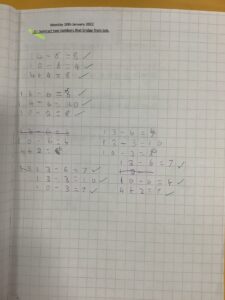Lots of learning!
The children have had a super week with lots of learning and creativity in the classroom. They have been exercising their gross motor skills by riding tricycles and also finding different ways to travel down a slippery slope safely. Inside, they have been developing their fine motor skills by threading, using scissors and mixing paint. We have also continued to explore the wintery weather by making some ice hangings which we filled with tiny objects and put into the freezer. The children were very interested to see what happened to them when we took them out of the freezer and put them in a tray inside the classroom for the afternoon.
Here are a few pictures of our wonderful week…
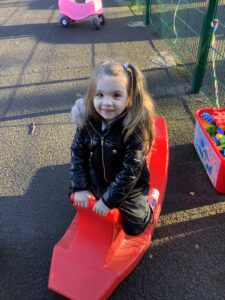
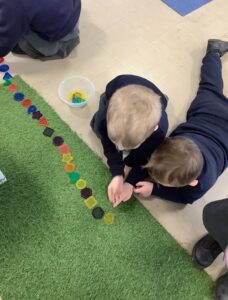
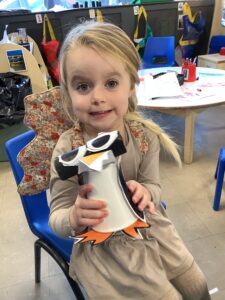
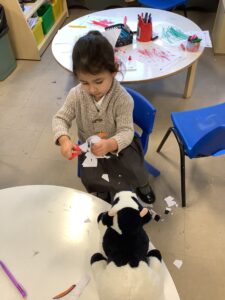
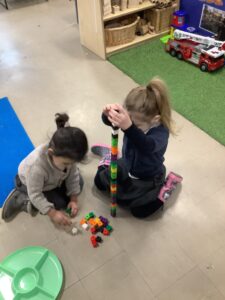
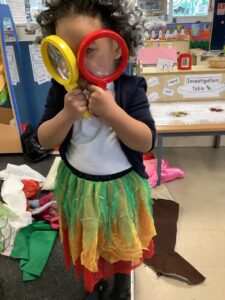
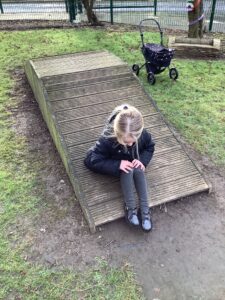
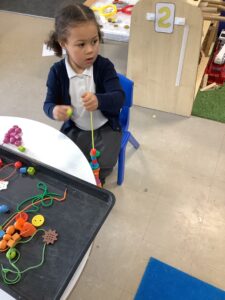
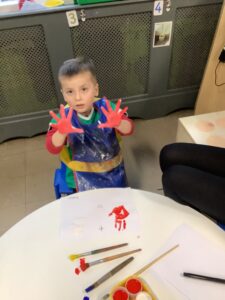
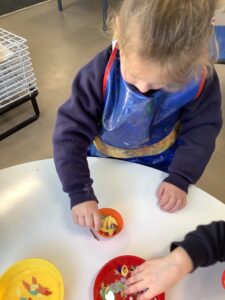
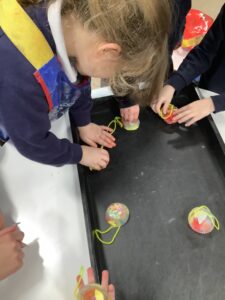
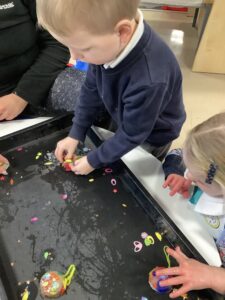
28 January 2022
This is the new list of spellings. In class, the children have been learning about prefixes. A prefix is a letter or group of letters added to the beginning of a word to make a new word. The prefix ‘un’ means not and the prefix ‘dis’ means not as well.
Year 3/4:
certain
advantage
avoidable
obey
aware
natural
decided
agree
We’ll test ourselves on Friday 4th February 2022 to see how we’ve got on.
For some tips and tricks on how best to practise your spellings at home, visit the Y3,4 spelling page on our website and click here
What a super week!
In literacy, we found out lots of new facts about penguins and compared the two polar regions. The children chose their favourite fact and wrote it in a sentence.
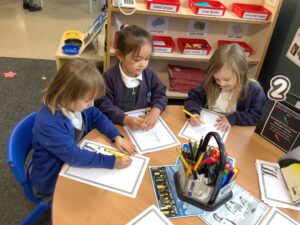
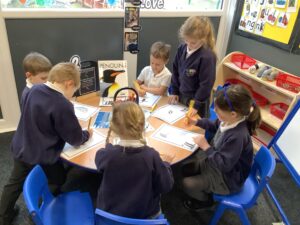
In music, the children continued learning about pulse through movement. They listened carefully to the song When the cold wind blows again and responded appropriately by using coordinated movements with the parachute.
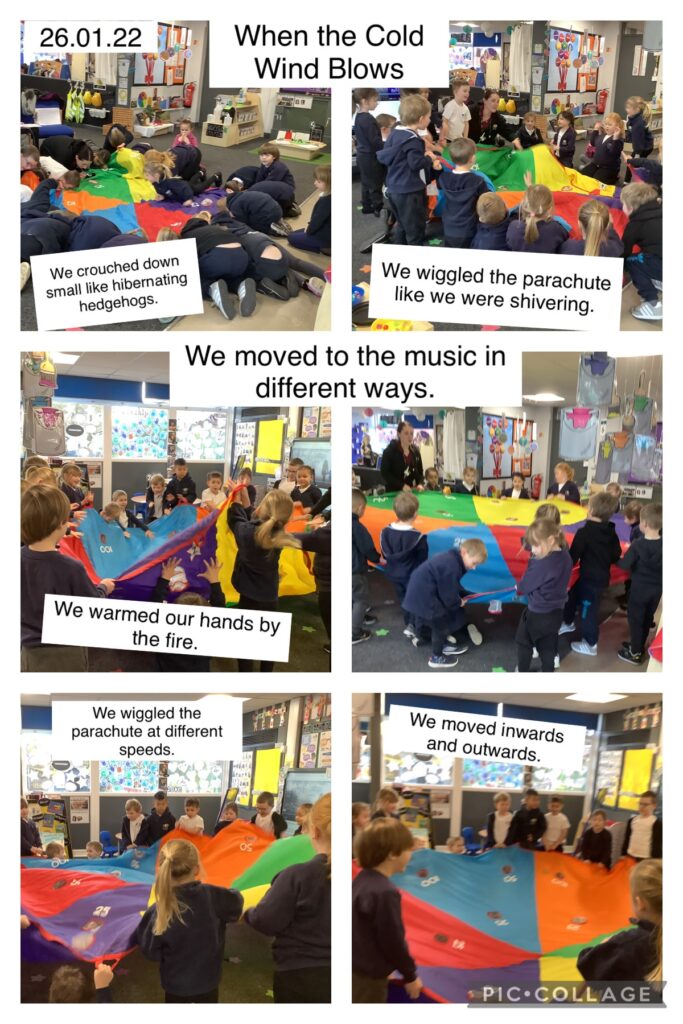
In maths, the children continued to develop their understanding of composition, or the numbers within numbers. We used the Hungarian number pattern (die pattern) to explore ways to represent numbers. By using this die pattern, it is helping the children understand the ‘5-ness’ of 5.
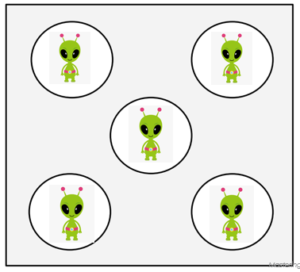
We started by sing the ‘5 Little Aliens in a Flying Saucer’ song to help us see remember the pairs of numbers that make 5. When another alien joined the gang, they quickly realised there was no space! HN said, “We need to build another spaceship.” Therefore, we used a double dice frame to begin to explore 6 and 7 as numbers that are composed of ‘5 and a bit’.
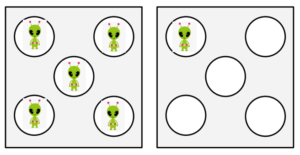
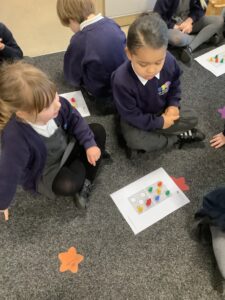
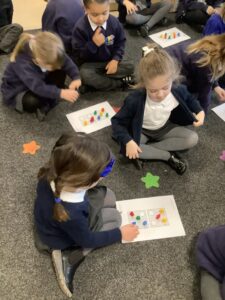
Outside, the children had fun making their own track games for their friends to play.
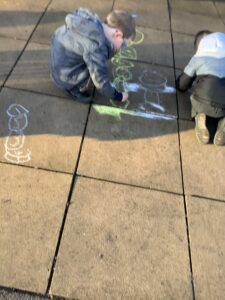
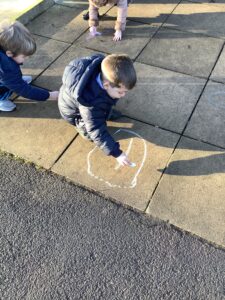
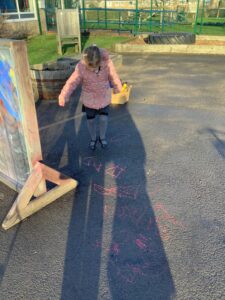
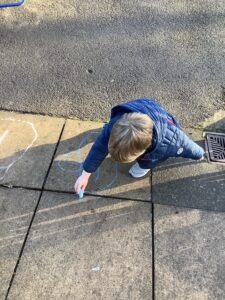
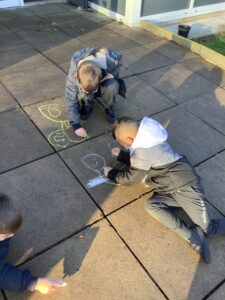 Have a look at what else we have been up to this week.
Have a look at what else we have been up to this week.
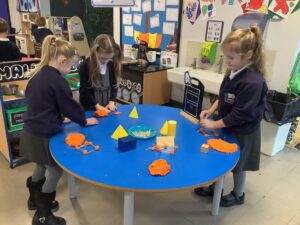
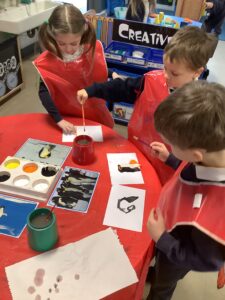
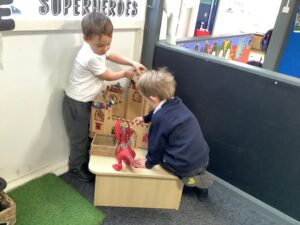
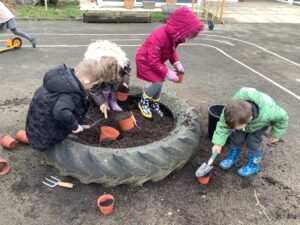
Home-Link Challenge

Finally, a new maths app has come out called 1-minute maths. If you download the app, we recommend using the subitising section.
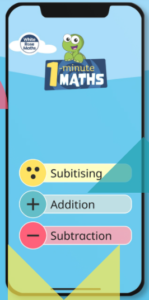
This week’s message (Friday 28 January 2022)
It’s been a tough week! In ten of the twelve classes at Scholes (Elmet) Primary, there have been positive cases of Covid. At Moortown Primary, one third of staff have been absent (though not all with Covid). St James’ CE Primary has similar problems, though thankfully not 25% Covid amongst pupils as is the case with another Wetherby school. With Covid cases still so high in our schools, please do stay vigilant to symptoms and get them tested if they’re not feeling quite right.
This week’s message comes from Mrs Allaway, who leads on Maths across Sphere Federation…
This year, Sphere schools are taking part in a new national programme for Reception, Year 1 and Year 2: ‘Mastering Number’. The programme aims to secure firm foundations in the development of good number sense for all children. The aim over time is that everyone leaves Key Stage 1 with fluency in calculation and a confidence and flexibility with number.
Why is fluency with number facts so important?
We want all children to develop fluency with number facts because we know this makes a huge difference to their progress in maths. For children who find maths difficult, it’s often the case that their only strategy is to count. They don’t see the relationships or make the connections that make maths easier. For example, if five and two is seven, seven minus two must be five – that’s the relationship within the maths.
An over-reliance on counting not only makes maths more difficult, it also inhibits flexibility, thinking and the development of problem-solving strategies. It doesn’t just affect calculating, it affects maths much more widely. We need children to have stopped counting by the time they move into Key Stage 2.
What is number sense?
Alongside fluency in number facts, we want our children to develop ‘number sense’: a flexibility with number where they reason; they see relationships; they see mathematical structures; and they see such things as if six and three is nine, then nine minus three is equal to six. These relationships won’t change in Key Stage 2 and beyond, the numbers just become bigger and more complex.
We want to support all children to think mathematically, make connections and see relationships because we know these are the characteristics that make maths learning successful.
Mastering Number sessions
In our short focused sessions for children in Reception, Year 1 and Year 2, we give children opportunities to think deeply about mathematical relationships and time to practise and really embed fluency with number facts. These 10 minute sessions are in addition to our main daily maths lesson.
In some sessions, we focus on deepening children’s understand of the composition of number: inside numbers there are other numbers. For example, inside eight there’s five and three, there’s six and two. Knowing that inside numbers are other numbers enables children to develop fluency skills.
We’re also developing skills in subitising. This is the ability to look at a small number of objects (often a maximum of about five) and instantly recognise how many there are without needing to count them one by one. This plays a key role in helping children see how numbers are made up, avoiding an over-reliance on counting.
One of the key resources children use in Mastering Number sessions is a rekenrek – a type of abacus or number rack. It supports children to feel and visualise numbers as well as noticing how numbers relate to each other. Children begin to build up strong visual images by first doing, seeing and noticing the maths.
How can I help at home?
Regularly accessing NumBots will support children to practise and really embed and develop crucial number facts. If you need help accessing this, please contact your child’s class teacher.
Children in Key Stage 2 who struggle with Maths could use NumBots too – ask your child’s teacher. (And don’t forget the importance of knowing times tables – including division facts. You don’t need to use Times Tables Rock Stars, but it’s one way to practise at home.)
For those of you with a child in Early Years and Key Stage 1, don’t forget there’s a Zoom session about our updated provision for learning phonics and practising early reading skills: 6pm on Monday 31 January. Contact us for the Zoom details in case you missed them.
Have a good weekend.
Living and Learning – identity
This week, in Living and Learning, we have continued to look at identity. Our statement is ‘I respect my communities and other communities’.
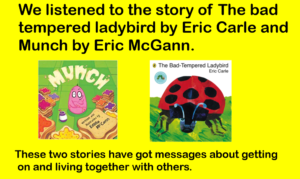
After we had listened to each story we came up with ideas on how to finish the follow sentence.
We can live well together with others by…
“Paying each other compliments,” said Shae.
“Sharing and take turns with each other,” said Elara.
“Being kind and loving to each other,” said Isla.
“Caring for our friends, family and pets,” said Emily.
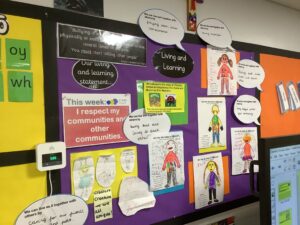
Partitioning number 0-5
Year 1 have been partitioning into two and three parts. We have looked at the number bonds 1 – 5 and became confident at splitting it into 2 parts.
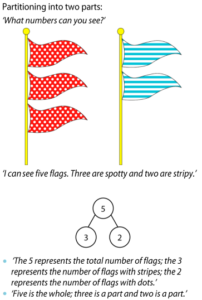

We have also looked at finding a missing part when one part and the whole is known.
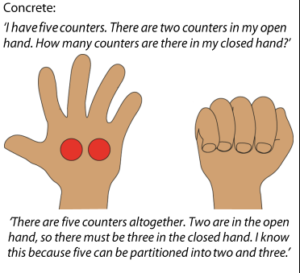
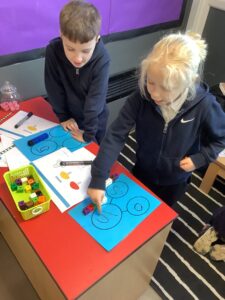

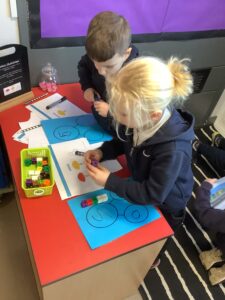
28 January 2022
This is the new list of spellings. Write them in your best handwriting. Remember that ascenders go to the top of the line and descenders go under the line. If you’re in Year 2, try to join your letters.
Year 1: Monday, Tuesday, Wednesday, Thursday, Friday, Saturday, Sunday
Year 2: half, hold, hour, improve, kind, last, many, mind, money, most
28 January 2022
Spellings this week again focus on specific prefixes. The focus this time is on un- and ir- . Please learn the words for a test on Thursday 03 February.
- unavailable
- unfamiliar
- unnecessary
- impractical
- impossible
- immature
- illegible
- irregular
- irreplaceable
28 January 2022
There’s a moral theme to this week’s Talk Time.
It is a waste of our time to learn about the past as it has already happened and we can’t change it.
This is a very topical statement given that we’re currently in the middle of a history topic. You may already have an opinion on this but it’s always worth pausing to consider a range of viewpoints.
This week’s R2s will help you to provide a balanced argument before you reach a conclusion:
- What are the reasons for (the pros) learning about the past?
- What are the reasons against (the cons) learning about the past?
- Reach a decision. Is it valuable to learn about past events?
- One list may have more points than the other.
- Some points have a greater importance than others.
One way to approach this Talk Time is to have a debate with people in your household. This will not only help you generate ideas but also practise a range of oracy skills. The last half term’s focus was building on the views of others and reasoning. When someone raises a point that you’re in agreement with, use one of the following phrases to start your response:
- I agree with you because…
- That’s a good point. I also think that…
- Furthermore, I’ll add that…
On the other hand, you may disagree with a point made by a family member. When that’s the case, it can be hard not to interrupt them. The oracy focus for this half term is turn taking. To be respectful of others’ opinions, wait until a person has finished speaking and then respond using one of these sentence starters or one of your own:
- I hear what you’re saying but…
- That’s a good point. However…
- I take your point but…
Year 2 Maths
In Maths, Year 2 have been learning two different subtraction methods.
How to subtract two numbers that bridge through ten.
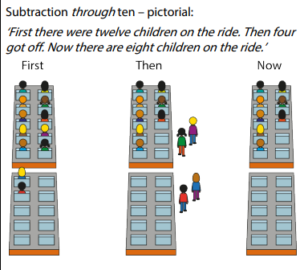
How to subtract two number that bridge from ten.
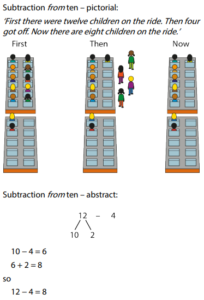
We then used ten frames and counters to model the story and compare the two methods.
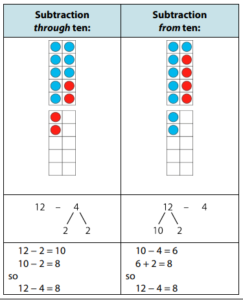
When they were confident with verbally telling the story the children had a go at writing some subtraction sentences, using the two different methods.
